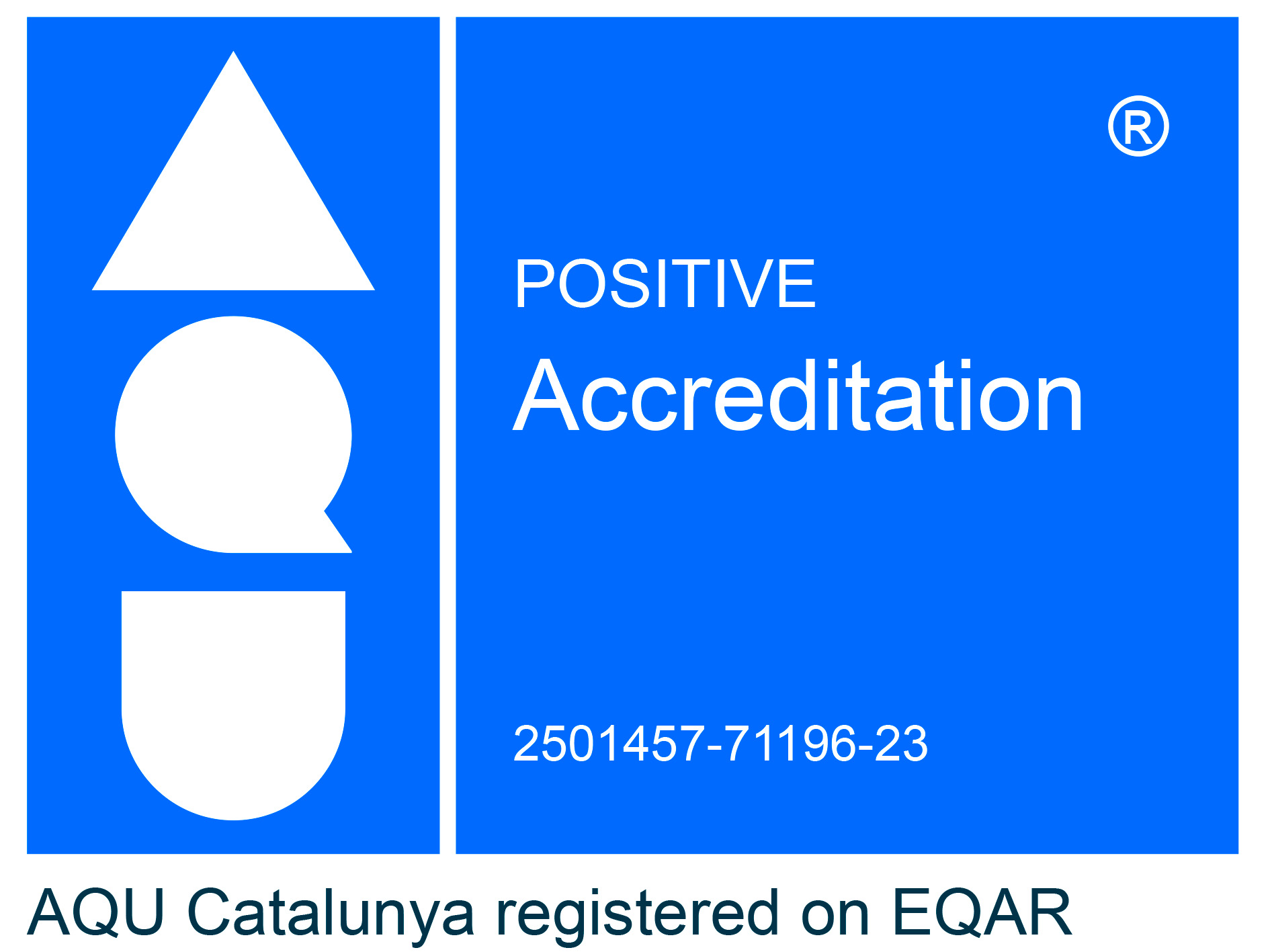Bachelor’s Degree in Journalism
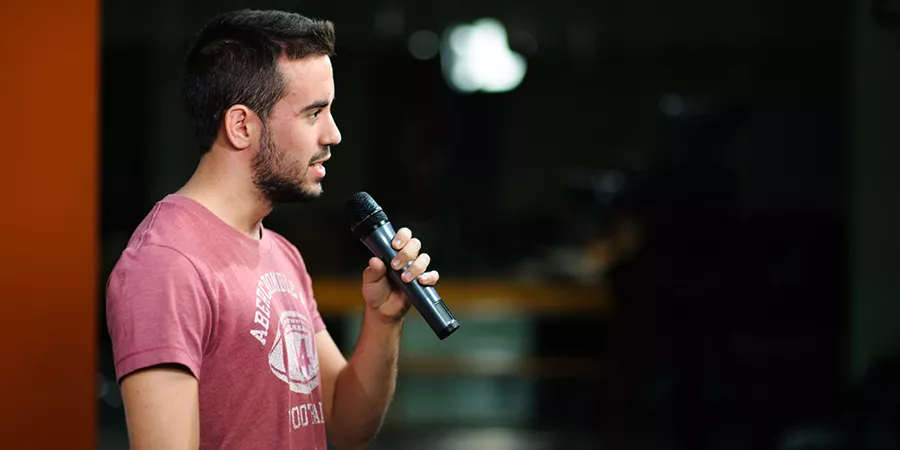
Our numbers speak for themselves
In direct contact with the profession from the beginning
Reasons to study
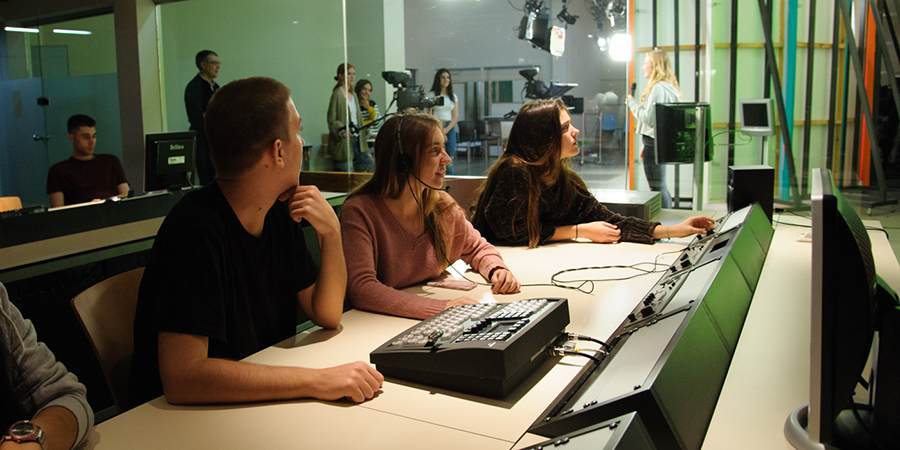
New career opportunities
Discover all the career opportunities for future journalists.

We open the doors to the world
We train you to work internationally. Sector-specific English, professional workshops and classmates from up to 60 different countries.

Internships at the industry's best businesses
Catalunya Ràdio, La Vanguardia, La Ser, Tele 5, Antena 3...
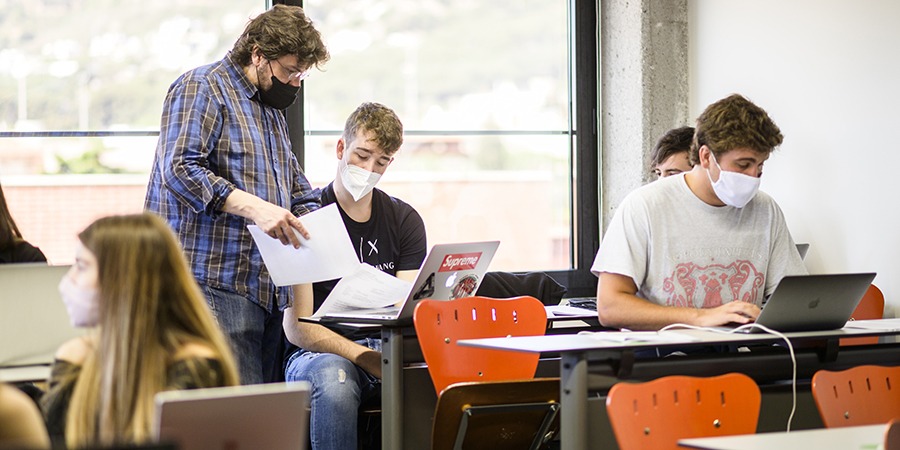
Friendly, individual attention
We are committed to you: we want to be your partner throughout your degree programme. For this reason, we are always available to provide friendly, personal support and guidance.
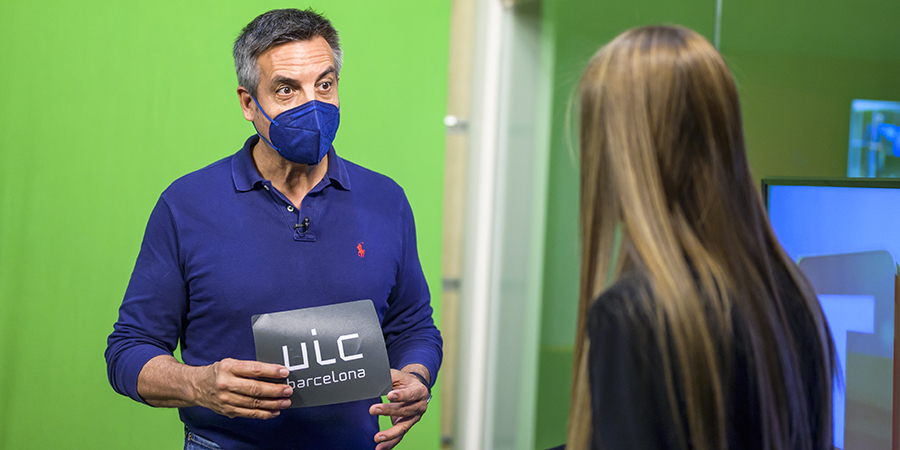
High quality teachers
Our teaching staff includes doctors, researchers and renowned professionals currently working in the industry.
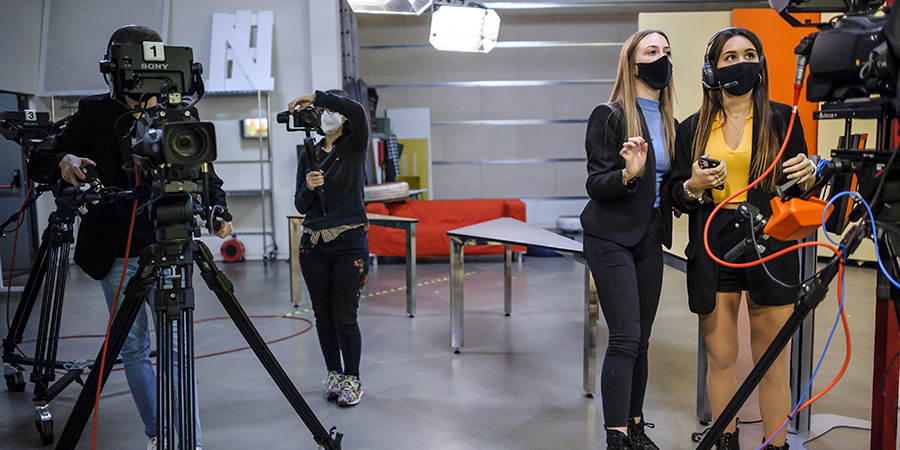
World class facilities
You will have access to Digital Media Studios and material from the beginning that you can also use for your personal projects.
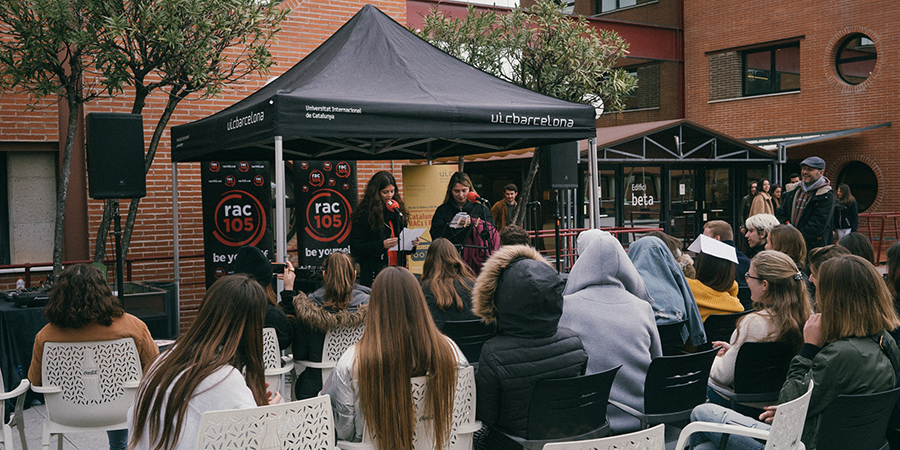
Activities
Enjoy learning at especially organised conferences such as Radio Day or Més periodisme.
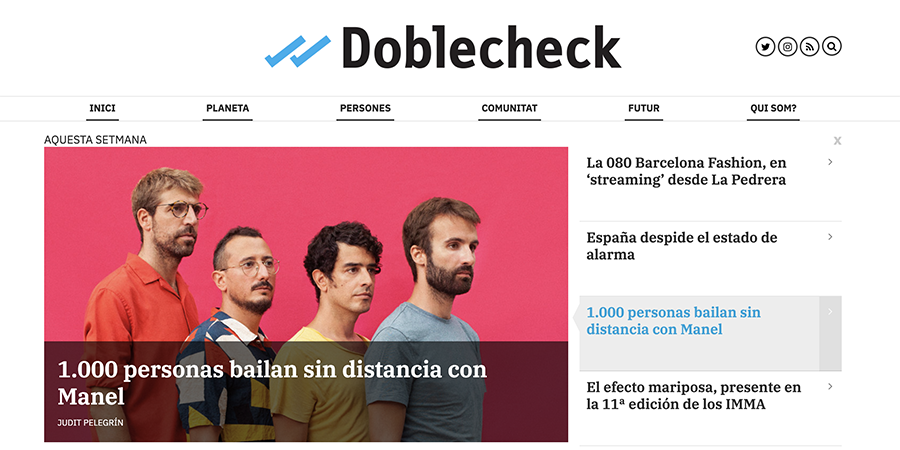
Doblecheck
Doblecheck is the media multiplatform of the UIC Faculty of Communication students. A showcase for future journalists to show their work and develop their skills.
Prepare for more job opportunities
At UIC Barcelona, we teach you the skills necessary to successfully adapt to the job market.
- TV presenter
- Radio journalist
- Writer
- Reporter and correspondent
- Head of Press
- Institutional Communicator
- Research Journalist
- Multimedia content creator
- Network information management expert
- Political communication adviser
- Journalist at a communication office
Professors and lecturers with long experience in the communication sector

The Faculty’s teaching body consists of lecturers and professors who are also active in the private sector and who have long experience in the audiovisual, journalism and advertising sectors. The teaching staff are all in direct contact with the daily reality of this profession, since they combine their executive roles in the media with teaching in the Faculty. This allows students to achieve an education that is at the cutting-edge of the sector, that facilitates work placements and allows for greater labour insertion. Also, the teaching staff have extensive research experience at both a national and international level acquired through visits to and exchanges with other universities.
With this degree, you can study part of the curriculum or do your internship abroad, with academic recognition
Participate during one semester or year at one of your faculty's partner universities, or search for a business abroad for your internship.
Get part of your ECTS during the summer at the Berkeley Summer Sessions, the best public university in the world.
Additional information
Presentation
In the Bachelor’s Degree in Journalism at UIC Barcelona, we create communication professionals capable of working in today’s media context, without losing sight of the social function of journalism or ethical values. We help students master new technologies and digital tools, ensuring they are able to meet the profession’s current challenges in any medium or format.
This degree is intended for anyone interested in pursuing a career in communication, whether as a writer of journalistic information in any medium (radio broadcaster, television presenter, print journalist, community manager for digital media...) or in media or media company management. Some of the practical tasks assigned in this degree programme include writing news stories for written press, performing a radio broadcast in English and editing a documentary.
Our academic project, through work in small groups and quality teaching, helps maximise student performance. To this end, we have a committed teaching staff made up of both academics dedicated to teaching and research and prestigious journalists who work at some of the biggest media companies in television, radio and press.
We also offer students the opportunity to gain work experience at some of the industry’s most renowned companies, giving them initial contact with the professional world and helping them acquire the skills necessary for a successful transition to the job market. TV3, Telecinco, La Vanguardia, El Periódico, Cadena SER, Radio Cope and Catalunya Ràdio are just some of the over 120 organisations with which we hold a work placement agreement.
In addition, UIC Barcelona’s adaptation to the Bologna Process enables students to work as journalists anywhere in the European Higher Education Area.
Objectives
Our main aim is to create excellent journalists, with the skills necessary to work in today’s new media scenario. With this principle in mind, our model focuses on achieving a series of objectives:
- To create responsible professionals who are fully aware of the social aspects of journalism.
- To provide students a high-quality general education that takes into account the profession’s ethical values.
- To foster an enterprising spirit and business perspective.
- To help students acquire the knowledge and skills necessary to comfortably handle the new media context and undertake communication projects that are adapted to the characteristics of this scenario.
- To shape professionals with an international view of journalism, who are able develop professionally in a global context.
- To provide students the skills required to work flexibility and competently in any media company.
Prospective students
Anyone who fulfils the admission requirements and general prerequisites for access to the degree programme is eligible to apply. Most of our students have a background in humanities or social sciences, though students from all academic backgrounds are welcome.
This degree is intended for anyone who feels that journalism is their calling and wants to pursue a career in this sector. We are looking for driven students who are eager to learn and investigate; responsible people who are critically aware, analytical and enterprising, who know how to work as a team, are interested in current affairs and want to grow as communication professionals.
Competences: Graduates
Competences
Students will develop a series of general and specific competences that will enable them to work successfully as a communication professional in today’s media context.
Job opportunities
Job opportunities for programme graduates include:
Writer of journalistic information for any medium:
- Television: writer, reporter, editor, presenter, correspondent, scriptwriter and director.
- Radio: writer, editor, broadcaster, presenter, correspondent, commentator, scriptwriter and director.
- Written press: writer, correspondent, section editor, editor and editor-in-chief.
- Non-daily publications, magazines and weeklies: writer, correspondent, editor and director.
Media management:
- Social media expert-community manager: responsible for tasks such as managing the corporate blog or social media...
- Web page manager.
Media company management:
- Corporate communication departments and offices.
- Press officer or head of institutional communication.
Academic accreditation
Graduat o Graduada en Periodisme per la Universitat Internacional de Catalunya.
With this degree, thanks to UIC Barcelona's adaptation to the Bologna Process, students can work as a journalism professional anywhere in the European Higher Education Area (EHEA).
Teachers
- ACEVEDO GONZÁLEZ, Simón Gerardo
- AZNAR MARTÍNEZ, Daniel
- BAKER, Martyn Russell
- BARNOLA CANALES, Quim
- BUHIGAS CARDÓ, Pere
- BUIL GAZOL, Maria Pilar
- CANO CASTELLS, Francesc
- CASTILLO HINOJOSA, Ana María
- CLAVELL CORBERA, Ferran
- CÓRDOVA MARTÍNEZ, Suzanne
- DE POUPLANA I MIRA, María Paloma
- DORIA ALBURQUERQUE, Sergio
- FITÓ CARRERAS, Maria
- HERNANDEZ SERRET, Joan
- JIMÉNEZ REMACHA, Ana
- JUSTEL VÁZQUEZ, Santiago
- LACASA MAS, Iván
- LAGOS LABBÉ, Paola Soledad
- LLOBET BARRACHINA, Marc
- LOOSSENS, Rudi Irma Karel
- LÓPEZ GONZÁLEZ, Jesús
- MARTIN VICARIO, Lara
- MCKENZIE, Peter
- MIRÓ COMAS, Abel
- MORALES SOLANA, Doris
- NAFRIA MITJANS, Ismael
- OLIVA CAMPS, Hector
- PAMPÍN GARCÍA, Cristina
- PARRAMON ALCALDE, Marc
- PAZ PEREZ, Elisa
- PELLICER COLILLAS, Ramon
- PLA FONT, Maria Carmen
- PUERTAS GRAELL, David
- RAMÍREZ SIMON, Wendy Maria
- REDONDO FUSTÉ, Marc
- ROBERT AGELL, Francesc
- ROCA TRENCHS, Nuria Candela
- ROURA RIU, Jose Maria
- SÁEZ SÁNCHEZ, Javier
- SALICHS PEREZ, Elio Antonio
- SALMON CABELLO, Alejandro
- SÁNCHEZ COSTA, Fernando
- SÁNCHEZ GIMÉNEZ, Patricio
- SEBRIÀ MARSOL, Kilian
- SIGAUD SELLOS, Pedro
- SOLÉ RODRÍGUEZ, Sergi
- SORRIBAS FIERRO, Mario
- STANGER DEACON, Doris
- SWINNEN, Ann
- URMENETA ARBUSÀ, Miguel
- VALERO MERLOS, Pedro
- VILLANUEVA BENITO, Isabel
- VINCZE, Laura
Internship
Work experience
Contact with the professional world is an essential part of a comprehensive education. UIC Barcelona has work placement agreements with a large number of national and international companies for each of its degree courses. In the case of the Bachelor’s Degree in Journalism, we would highlight the following:
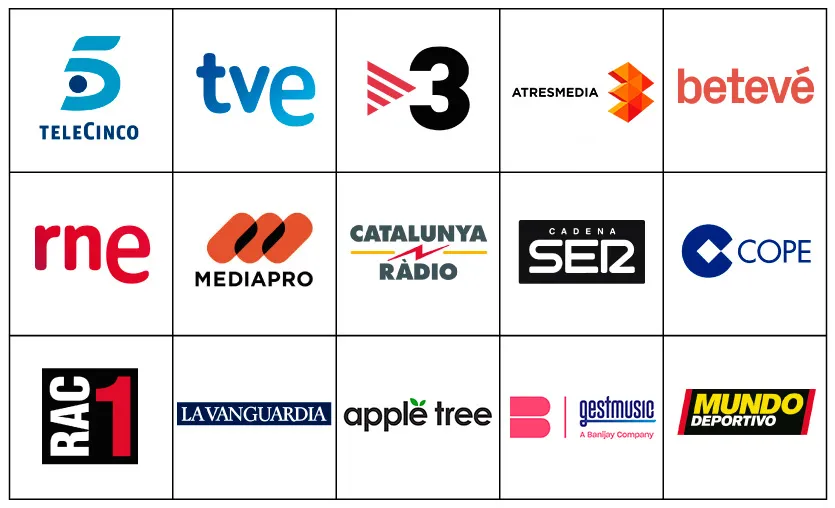
Objectives
The main aim of the work placements is for students to come into contact with the world of journalism and acquire all the skills necessary to successfully adapt to the labour market. Also, the work placement environment is ideal to apply the concepts learned in class.
At the UIC we connect with student’s professional futures and place a wide range of companies from the sector at their disposal for work placements. Likewise, we undertake individual monitoring to ensure that the objectives marked out are achieved in terms of the tasks to be undertaken, learning, assimilation of knowledge and the acquisition of competences.
All updated information regarding the specific organisation and regulations of work placements can be found in the Course Guide for the subject on each degree programme.
Job opportunities
The professional opportunities this degree will offer you include:
- Director: radio, television and written press.
- Scriptwriter: television and radio.
- Writer: television, radio, written press, publications, magazines, internet, news agencies, etc.
- Reporter: television, radio, written press, publications, magazines, internet, news agencies, etc.
- Editor: television, radio, written press, publications, magazines, multimedia content, news agencies, etc.
- Presenter: radio and television.
- Correspondent: television, radio and written press.
- Commentator: radio and television.
Press officer or head of institutional communication.
- Corporate communication departments and offices.
- Research and teaching.
- Media consultant.
- Website manager.
- Publishing jobs.
- Advertising and design agencies.
- Production companies.
- Fashion and trends industry communication.
Prerequisites & admissions
Application for admissions
To pre-register for undergraduate studies at UIC Barcelona, you will need to complete the application form available at the following link:
Entrance Examinations
The entrance exam is held several times throughout the year on the Campus Barcelona. To take the exam, you must first complete the application for admission.
Required documentation
The documentation required for the admission process varies according to each candidate’s academic background. Click on the following link to see what documents you will need to provide:
Reservation and enrolment
In order to reserve a place on the programme, admitted candidates must pay 20% of the first year fee upon receiving their letter of acceptance.
The remaining 80% is due after enrolment.
For more information:
Acces routes
Programme applicants may come to UIC Barcelona from different academic backgrounds. Click on the following link for detailed information on the route most pertinent to you:
Grants & financial aid
Grants
UIC Barcelona offers various fellowships supported by both public institutes (MEC or AGUAR) as well as private UIC Barcelona funds.
For further information, please check with our admissions department:
Financial aid
Each payment method is adhered to the specific financing conditions of each degree programme.
Please see the attached document for details on these conditions:
Discounts
Those seeking undergraduate degrees at UIC Barcelona may be eligible for different discounts depending on their circumstances.
Faqs
General information
How many places are there in the three Bachelor’s Degrees of the Faculty of Communication?
In Audiovisual Communication and Journalism there are 40 places for each degree. For Advertising and Public Relations there is a maximum of 60 places.
How much do the three Bachelor’s Degrees of the Faculty of Communication cost? And how much does the Double Degree in Journalism and Audiovisual Communication cost?
- Audiovisual Communication: € 9,900*
- Journalism: € 9,900*
- Advertising and Public Relations: € 9,900*
- Journalism & Audiovisual Com: € 10,890*
* Subject to revision each year
Does UIC Barcelona offer any grants or financial aid for studying in the Faculty of Communication Sciences?
You can find out all the various options including grants and discounts on our website. If you have an average mark of 8 or higher in your first year of
upper secondary education, you are eligible for a Grant for Academic Excellence, which entitles you to an 80% discount every year of study, provided
that you meet the conditions of renewal.
What is the class timetable? In which languages are the classes taught?
The classes are in the morning, between 8.00 a.m. and 3.00 p.m. They are mostly taught in Spanish and Catalan, with 15% of subjects in English each year.
Do I need to buy books or any other additional materials for class?
No, all teaching materials are available on the University’s digital platform and in the library. There are no significant material-related costs.
Are the most general subjects done together with students from the other degrees of the Faculty?
All the subjects of the bachelor’s degree are held with students of the same degree, since all the subjects are specifically focused on each field. Only English classes and 1 optional subject of the double degree of Audiovisual Communication & Journalism are shared.
From which course can work placements be done?
From the summer of the first year.
These practices are extracurricular
When are the curricular work placements?
Fourth year.
What are the Digital Media Studios?
These are the facilities of the Faculty of Communication, which contain a set, production room, sound studio, materials storage room and twelve post-production and editing rooms.
What is Transmedia Lab?
Two transmedia studios (107 m2) and a digital newsroom (138 m2). Multipurpose spaces where our students can work and experiment with hybrid formats.
Is there a possibility to complete an exchange during the degree?
Yes, UIC Barcelona has more than 50 agreements in 27 countries. We have three types of agreements:
- SICUE: mobility within Spain
- Erasmus: in Europe
- Bilateral agreements: outside Europe
They can last a semester or an entire academic year, from third year on.
What is the double degree with IONA College?
This option is available only for Journalism and for Advertising and Public Relations. It consists of studying the first three years at the Barcelona Campus, and finishing the fourth year at IONA College, New York. In this way a double qualification is obtained for this bachelor’s degree: in Spain and
the US.
How does the Double Degree in Journalism and Audiovisual Communication work?
In five years you will obtain two university degrees, one for Journalism and one for Audiovisual Communication. From the first year, you will begin
the two degrees simultaneously, taking the most prominent subjects of each of these two degrees. Classes will be in the morning.
Acces to the Bachelor's Degree
What is the requirement to enter to study in the Faculty of Communication if I come from secondary school?
You must pass the baccalaureate, the EvAU or equivalent and the entrance exams to UIC Barcelona to be admitted.
What do the entrance exams involve? Are they face-to-face?
They consist of three multichoice tests in English and spelling, and a brief interview with a teacher of the Faculty. The tests will be done online. Before the test, we will send you all the necessary information to access (how to connect, user, password, schedules...).
Are there any practice exams available?
We do not provide models of admission tests from previous years, but before tests we provide details and indications that are always helpful.
Can I choose the date of the Entrance Examination?
Yes, among the scheduled calls, which you will find on our website.
What are the exam times?
From 3.00 p.m. to 5.00 p.m., approximately. The interviews are conducted the day before the tests, between 2.00 p.m. and 6 p.m
When are admissions communicated?
7-10 working days after taking the entrance exams. You will receive an email in which you can download the resolution of the tests in the admissions portal and follow the next steps.
If I am ‘not admitted’ can I attend the next sitting during the same academic year?
No, you can only attend one sitting per academic year
How and when is the reservation completed?
By making a payment of 20% of the total tuition for the first year, within 15 days after being admitted.
If I reserve a place and then decide not to study at UIC Barcelona, will the reservation fee be reimbursed?
The reservation fee will only be fully reimbursed in event you do not pass your upper secondary studies or the Spanish university entrance exams
(PAU). This clause is laid out in the General Terms and Conditions.
What is the job placement percentage of graduate students?
88%
What is the usual teacher profile of the degree?
More than 80% of collaborating teachers are active professionals who come from the sector.
Where can I get practical experience during the degree?
We have over 470 agreements with prestigious companies.
What double degree options does UIC Barcelona offer me?
- Journalism & Humanities and Cultural Studies (5 years)
- Journalism & Audiovisual Communication (5 years)
- Journalism & BA in Mass Communication with a concentration in Journalism (4 years) UIC Barcelona and NY
- Advertising and PR & BA in Mass Communication with a concentration in Public Relations (4 years) Barcelona and NY
International mobility
Outgoing mobility stays
As a student of this degree programme, you may study abroad and receive academic recognition in most options.
Discover your mobility options abroad:
- Study abroad for a semester or a full academic year at one of your faculty’s partner universities.
- Erasmus traineeships, curricular, extracurricular or recent graduate work placements (according to the degree programme)
- International summer courses: UC Berkeley Summer Sessions, Penn Summer, Boston University Summer
- UCLA Extension Certificate Programmes
To find out what you need to do before, during and after your mobility stay, please see the following links:
- Agreements available for your degree programme
- Outgoing mobility regulations
- Steps required
Contact: exchange.bcn@uic.es
Incoming mobility stays
If you are studying at another Spanish or international university, why not study at UIC Barcelona for a semester or academic year.
To find out what you need to do before, during and after your mobility stay, please see the Study at UIC Barcelona page.
Contact: exchange.bcn@uic.es




